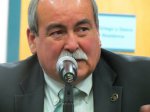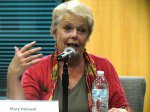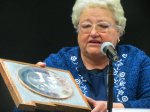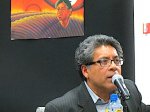Eidtor's Note: The Grant County Beat thanks Tom Vaughan for use of his notes and photos and his partner in FeVa Fotos, Sandy Feutz, for the use of her photos of the event.
Cesar Chavez Forum
Cesar Chavez Forum
From left are panelists Eddie Madrid, Mary Hotvedt and Rodolpho "Rudy" Martinez. (Photo by Tom Vaughan of FeVa Fotos)
http://www.grantcountybeat.com/images/2014newsitems/Front_Page_News/Cesar_Chavez_Forum/IMG_3800t.JPG
Cesar Chavez Forum
From left are Maria Monta+?ez, Dr. Felipe Ortego y Gasca, Patricia Cano and Dr. Magdaleno Manzanares. (Photo by Tom Vaughan of FeVa Fotos)
http://www.grantcountybeat.com/images/2014newsitems/Front_Page_News/Cesar_Chavez_Forum/IMG_3812t.JPG
Cesar Chavez Forum
Rodolpho "Rudy" Martinez. (Photo by Sandy Feutz of FeVa Fotos)
Cesar Chavez Forum
Mary Hotvedt (Photo by Sandy Feutz of FeVa Fotos)
Cesar Chavez Forum
Eddie Madrid (Photo by Sandy Feutz of FeVa Fotos)
Cesar Chavez Forum
Dr. Felipe Ortego y Gasca (Photo by Sandy Feutz of FeVa Fotos)
Cesar Chavez Forum
Maria Monta+?ez (Photo by Sandy Feutz of FeVa Fotos)
Cesar Chavez Forum
Patricia Cano (Photo by Sandy Feutz of FeVa Fotos)
Cesar Chavez Forum
Dr. Magdaleno Manzanares (Photo by Sandy Feutz of FeVa Fotos)
Thursday night's monthly forum was devoted to the legacy of Cesar Chavez, with emphasis on the local impacts of his organizing work.
The forum featured personal experiences of people who had worked with Cesar Chavez and/or his associates and who had personally experienced the discrimination against Mexicanos/Chicanos/Latinos/Hispanics (all the terms were used) in their lives.
Not in the order they spoke, the eldest is reported first. Dr. Felipe de Ortego y Gasca, a retired professor, is now Scholar in Residence at WNMU. He's 87, and this is his 50th year in higher education.
It was pointed out that Cesar Chavez was a year younger than Dr. Ortego, to which he responded: "Everybody was younger than me!"
He was born in 1926 in Illinois ("not in a log cabin") to parents who were campesinos who had come from Mexico a few years earlier to be agricultural workers, following the crops. He remembered his father making a garden everywhere they stopped, so there was sympathy with the farm workers. Felipe first met Chavez in 1964, said he truly deserved the Nobel Peace Prize (which he didn't get), and that he was like Gandhi in his approach to the struggle for justice. Dr. Ortego called Chavez one of the "four pillars of the Chicano Movement."
"I have a PhD. in English literature ... but I don't have a high school diploma." Dr. Ortego was the first Mexicano to get a PhD. in English lit at the University of New Mexico. He said that, while he was teaching at the University of Arizona, he often lunched with Chavez and heard his stories of his work. "I'm standing on the shoulders of those who went before us," Dr. Ortego said.
At the other end of life, more than 60 years younger than Dr. Ortego, was Maria Montañez, a WNMU student, who was born and raised in Tucson. As a junior and senior in high school, she took the ethnic studies classes that were offered. A brother of Cesar Chavez visited the class, which she said was very diverse, motivating and inspiring. The Tucson school district famously banned the class and the textbooks from the school, even coming into the classes while in session and taking the book, she said. She said she keeps the legacy of Cesar Chavez in her heart.
Rep. Rudy Martinez recalled that, when he started school in Hurley, it was segregated. So was the town - North Hurley was Hispanic, Hurley was not and there was a tunnel connecting the two. There was a segregated movie theater in Hurley—nice seats for the Anglos, benches for Mexicanos and ejection if a Mexicano sat in the wrong place. After serving in the military, having a variety of jobs at the mines, joining unions along the way, he became a shop steward and member of the negotiating team for the International Brotherhood of Electrical Workers, and is still a member.
Mary Hotvedt, trained as an anthropologist, was a union organizer in Wisconsin and Texas. As a kid, growing up in a Wisconsin town known for pickles, she picked pickles. Later she drove the bus, taking workers to the fields. She said Chavez inspired Chicano power, though, as an Anglo, she worked in the background, editing a Spanish language newspaper that helped to unite workers. Wisconsin had labor laws protecting farm workers and their rights to organize; workers who made gains there carried their success to Texas, at the other end of their picking cycle and worked for reforms there. "He worked closely with Dolores Huerta," Hotvedt said of Chavez's relationship with his organizing partner.
Eddie Madrid related a life of experience as a local Hispanic working in the copper mines and the inequities he and his family had faced. When his father worked in the Kennecott-owned copper mines, the showers were segregated and "No Mexicans or dogs allowed" signs were posted. The pay lines were red chip (Hispanic laborers) and blue chip (Anglo skilled laborers), and, of course, the red line pay was lower. On one crew, his foreman was illiterate; one of his literate Hispanic co-workers did the bookwork for the foreman. Eddie became a supervisor, but found he was ignored by the Anglo workers on his crew. In another supervisory job, after Kennecott sold the mines to Phelps-Dodge, rather than being considered for a promotion (because he didn't have a college degree), he was asked to train several others recruited for that job, one of whom also didn't have a college degree. When an economic downturn brought layoffs, he related that Anglo co-workers laid off got settlement packages with benefits; he, with 37 years service, was put on unemployment and told he might be called back (but never was).
Dr. Magdaleno Manzanares, WNMU Vice President for External Affairs, moderator and panelist, introduced Patricia Cano as the only faculty member who had supported his appeal to have the new WNMU library named for Cesar Chavez. She said she came to WNMU in 1971 as "one angry Chicana!" after being told in Silver High that she couldn't speak either English OR Spanish well. She said Dolores Huerta (who's still alive at 83) has inspired her to remain active. She plans to retire from WNMU in August, but believes she will find another role. Cano agrees with Huerta's observation that the various movements (Chicano, women's, LGBT, African-American) need to unite their efforts, not work alongside or against each other. "Social justice is a big issue; our job is not done," Cano said and urged those in attendance to register to vote at the back of the room.
Dr. Manzanares opened with a recollection of crossing the border as a high school student with 10-page paper he'd written on Cesar Chavez. A border patrol officer asked about it and Manzanares explained that it was a school paper. The officer grumbled about what public education was coming to, to which Manzanares replied that he was attending a Catholic high school. Later, after doing some work in radio, he had the opportunity to work with Chavez, traveling with him to help with public relations. One of his recollections of Chavez was that he was a calming person, always projecting a pleasant countenance—Chavez could be smiling while saying, "You are a son of a bitch."
During the questions and answers, it was mentioned a couple of times how the women who walked the picket line for their men in the Empire Zinc Mine strike immortalized in the movie "Salt of the Earth" improved the role of women in the labor movement. They reminded the men, "We're walking the line for you." Mary Hotvedt related the story of women, who picketed the police and mayor in Pharr, TX, after a riot that killed one young man, saying they "were inspired by the women of 'Salt of the Earth.'"











